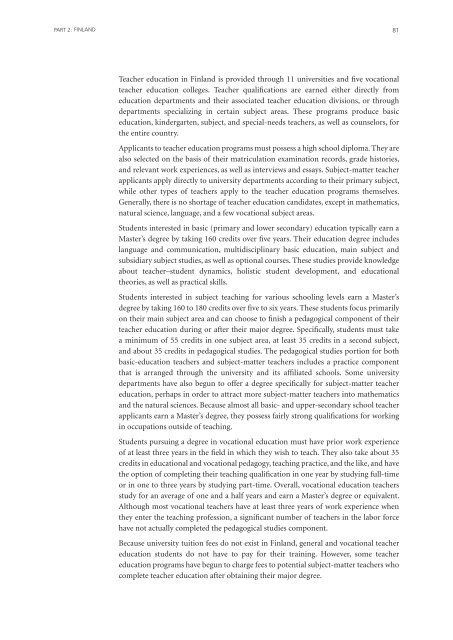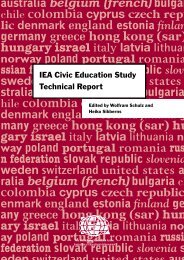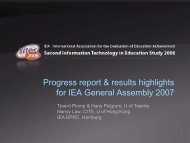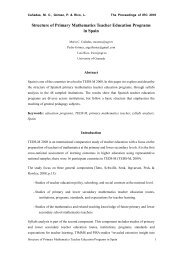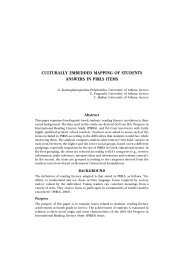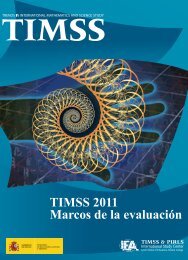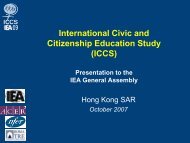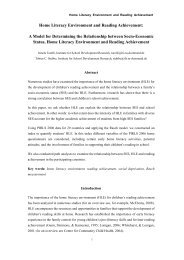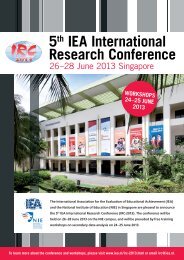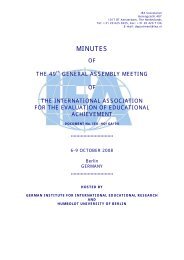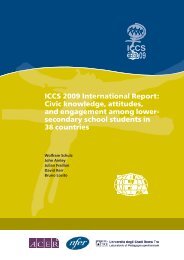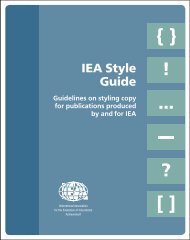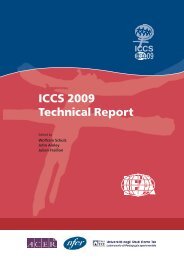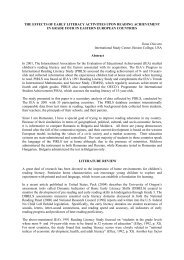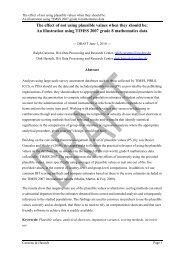Teacher Education and Development Study in Mathematics - IEA
Teacher Education and Development Study in Mathematics - IEA
Teacher Education and Development Study in Mathematics - IEA
Create successful ePaper yourself
Turn your PDF publications into a flip-book with our unique Google optimized e-Paper software.
PART 2: FINLAND<br />
81<br />
<strong>Teacher</strong> education <strong>in</strong> F<strong>in</strong>l<strong>and</strong> is provided through 11 universities <strong>and</strong> five vocational<br />
teacher education colleges. <strong>Teacher</strong> qualifications are earned either directly from<br />
education departments <strong>and</strong> their associated teacher education divisions, or through<br />
departments specializ<strong>in</strong>g <strong>in</strong> certa<strong>in</strong> subject areas. These programs produce basic<br />
education, k<strong>in</strong>dergarten, subject, <strong>and</strong> special-needs teachers, as well as counselors, for<br />
the entire country.<br />
Applicants to teacher education programs must possess a high school diploma. They are<br />
also selected on the basis of their matriculation exam<strong>in</strong>ation records, grade histories,<br />
<strong>and</strong> relevant work experiences, as well as <strong>in</strong>terviews <strong>and</strong> essays. Subject-matter teacher<br />
applicants apply directly to university departments accord<strong>in</strong>g to their primary subject,<br />
while other types of teachers apply to the teacher education programs themselves.<br />
Generally, there is no shortage of teacher education c<strong>and</strong>idates, except <strong>in</strong> mathematics,<br />
natural science, language, <strong>and</strong> a few vocational subject areas.<br />
Students <strong>in</strong>terested <strong>in</strong> basic (primary <strong>and</strong> lower secondary) education typically earn a<br />
Master’s degree by tak<strong>in</strong>g 160 credits over five years. Their education degree <strong>in</strong>cludes<br />
language <strong>and</strong> communication, multidiscipl<strong>in</strong>ary basic education, ma<strong>in</strong> subject <strong>and</strong><br />
subsidiary subject studies, as well as optional courses. These studies provide knowledge<br />
about teacher–student dynamics, holistic student development, <strong>and</strong> educational<br />
theories, as well as practical skills.<br />
Students <strong>in</strong>terested <strong>in</strong> subject teach<strong>in</strong>g for various school<strong>in</strong>g levels earn a Master’s<br />
degree by tak<strong>in</strong>g 160 to 180 credits over five to six years. These students focus primarily<br />
on their ma<strong>in</strong> subject area <strong>and</strong> can choose to f<strong>in</strong>ish a pedagogical component of their<br />
teacher education dur<strong>in</strong>g or after their major degree. Specifically, students must take<br />
a m<strong>in</strong>imum of 55 credits <strong>in</strong> one subject area, at least 35 credits <strong>in</strong> a second subject,<br />
<strong>and</strong> about 35 credits <strong>in</strong> pedagogical studies. The pedagogical studies portion for both<br />
basic-education teachers <strong>and</strong> subject-matter teachers <strong>in</strong>cludes a practice component<br />
that is arranged through the university <strong>and</strong> its affiliated schools. Some university<br />
departments have also begun to offer a degree specifically for subject-matter teacher<br />
education, perhaps <strong>in</strong> order to attract more subject-matter teachers <strong>in</strong>to mathematics<br />
<strong>and</strong> the natural sciences. Because almost all basic- <strong>and</strong> upper-secondary school teacher<br />
applicants earn a Master’s degree, they possess fairly strong qualifications for work<strong>in</strong>g<br />
<strong>in</strong> occupations outside of teach<strong>in</strong>g.<br />
Students pursu<strong>in</strong>g a degree <strong>in</strong> vocational education must have prior work experience<br />
of at least three years <strong>in</strong> the field <strong>in</strong> which they wish to teach. They also take about 35<br />
credits <strong>in</strong> educational <strong>and</strong> vocational pedagogy, teach<strong>in</strong>g practice, <strong>and</strong> the like, <strong>and</strong> have<br />
the option of complet<strong>in</strong>g their teach<strong>in</strong>g qualification <strong>in</strong> one year by study<strong>in</strong>g full-time<br />
or <strong>in</strong> one to three years by study<strong>in</strong>g part-time. Overall, vocational education teachers<br />
study for an average of one <strong>and</strong> a half years <strong>and</strong> earn a Master’s degree or equivalent.<br />
Although most vocational teachers have at least three years of work experience when<br />
they enter the teach<strong>in</strong>g profession, a significant number of teachers <strong>in</strong> the labor force<br />
have not actually completed the pedagogical studies component.<br />
Because university tuition fees do not exist <strong>in</strong> F<strong>in</strong>l<strong>and</strong>, general <strong>and</strong> vocational teacher<br />
education students do not have to pay for their tra<strong>in</strong><strong>in</strong>g. However, some teacher<br />
education programs have begun to charge fees to potential subject-matter teachers who<br />
complete teacher education after obta<strong>in</strong><strong>in</strong>g their major degree.


